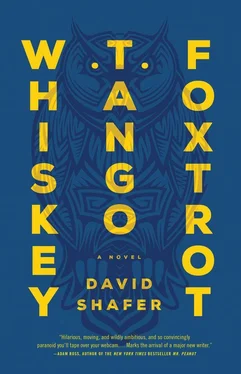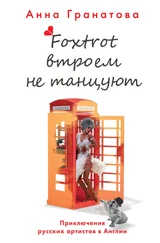At that, Two shot a quick glance at Leila. He was appraising her. Had she looked listen-y? She needed to appear oblivious. From her fancy knapsack, which was out of the men’s sight, she took the sunflower seeds that she’d brought from Mandalay. Noisily, she rustled them out of the newspaper envelope they were wrapped in, but she brought them to her mouth delicately, one by one, in the slightly feral way she had seen women eat seeds here. It seemed to work — Two quit looking at her and plucked flecks of tobacco from his lip. Leila dialed her ears up to ten.
“I’m just sayin’,” said One, sulkily. “I didn’t sign on to be a bellhop in Burma.”
“We’re in China,” said Two.
“Yeah, right. China,” said One.
Aung-Hla came out of the office, down the metal steps. He was effusively thanking the man in the office. The security men tracked him to the car. Don’t speak English to me, Leila was thinking hard at Aung-Hla as he opened his door.
“We are hunky-dory,” he said to her loudly, smiling because he had just accomplished something rather complicated. The security men stiffened at the English. Two looked at Leila again, harder now.
“No more English, Aung-Hla,” she snapped at her driver, in Burmese. She pitched her voice high and nasal, in a way she hoped sounded convincing. Burmese was a tonal language, but Leila, like most Indo-European speakers, was reluctant to attempt the tonal part, because she thought it made her sound like an aggrieved crow. “Those men no good,” she cawed quickly at Aung-Hla. “Talk Burmese to me. Now.” And he did. He understood her meaning and spoke a rapid Burmese paragraph, which she did not understand.
“Leave now. Us both,” she said. And they did; Aung-Hla executed a quick three-point turn and they headed back down the road they’d come up. Leila found her fancy running watch in her knapsack and pressed the MARK POINT button.
She tried to explain to Aung-Hla what had happened. It was difficult. She didn’t know how to say contractors in Burmese, or mercenaries. She managed soldiers who don’t work for the government . And when she told Aung-Hla that Americans were not allowed to work in Myanmar, he said, “But you work here.”
That night, after they got back to Mandalay and Aung-Hla had dropped Leila off, she filled out the Helping Hand paperwork that would allow her to pay Aung-Hla as not just a taximan but a “required national.” She put the equivalent of three hundred dollars in an envelope, managed to copy Aung-Hla’s name in Burmese script on the front of it, and put the envelope in her knapsack. She looked forward to giving him the money and tried to think only of the benefit it would bring him, not of the stark difference in power between them that it would make plain.
Chapter 2: Portland, Oregon
Turning his head to look at the Fremont Bridge sparkling in the sharp light of the November morning, Leo felt his chin rasp across the collars of his two woolen shirts and his canvas work coat. The outfit thickened the upper half of his tall thin frame, which even at rest had a teetering quality. Hunched into the wind, proud over the handlebars of his bicycle, he looked like a heavy kettle on a high shelf, and most in his path gave him wide berth. But it was early yet, just light and still cold; there weren’t many in his path.
As he did most every day now, Leo wished that he were biking over the Fremont Bridge instead of the bridge he was biking over, the Broadway Bridge, which was a more workmanlike affair, maroon and million-riveted; a bascule bridge with chunky block piers like galoshes. The Fremont Bridge was so beautiful, massive and graceful at once, a marvel of engineering. A brisk wind in the seagullosphere snapped the flags at the apex of its arc. The river below was a deep, churning green.
One morning six months back, Leo had found his car skewed and curb-jumped before his house. So it was no dream, he’d thought, filled with shame and dread and panic. It was easier to quit driving than drinking, so Leo had transformed himself into a committed cyclist. But now, the fact that there was no pedestrian or bike path on the Fremont Bridge was an affront to him. Leo knew well that driving over the top deck of that bridge, especially at speed, was a real zooter. A state-subsidized roller coaster for the auto-addicted, he thought to himself as he looked at the Fremont’s graceful trajectory, which lay along a much shorter path between his home and workplace — another affront, to be denied not only the most glamorous but also the most direct route to his destination. Why should so much of the might of the state go to flinging out these ribbons of concrete so that citizens can zoom around in their private metal zoom-arounders?
He was getting indignant. Leo was good at indignant. Also burdened; he could do a good burdened. But indignant was one of the few aggressive postures he could strike convincingly — something having to do with the mix of blue-blood Yankee yeoman farmer and Mayflower screwball and tough prairie Protestant in his pedigree. A crackpot uncle of his, in Maine, had twice handcuffed himself to heavy equipment to obstruct the construction of cell phone towers. There was a gene Leo wouldn’t mind expressing.
Yes, he thought as he passed too close to a shuffle-jogging man upholstered in a damp terry tracksuit, pedaling over the Fremont Bridge in the morning would be an excellent start to the day . Maybe he should lead a political campaign to get a pedestrian and bicycle right-of-way added to the bridge. Maybe by his efforts the bridge would become a century-defining nonmotorized boulevard and, upon his death, from kiteboarding or something, would be named after him. A man who looked like a teddy bear was cursing at him. Why?
Now a gust came up off the water and flung the tassel-terminated strings of his woolen hat behind his head. He biked faster. The gust brought him news — yeast and pine gum and benzene and bleach and fir and mud and pulp and slurry. Atop the Fremont Bridge, you could probably smell for miles, thought Leo as he coasted across the humbler bridge, filling his lungs with air and his eyes with light.
Then a cloud scudded before the sun and the bridge quit humming beneath him and the wind ceased to carry meaning and in countless other ways the grandeur fled, like shining back into shook foil. The strange brew of neurotransmitters that had encouraged the bike-activist fantasy sloshed up against some limiting mechanism and began to recede; the recipe was tweaked, and chemicals brushed past one another, exchanging glances, methyl groups. Leo started the process, which would increase in period and intensity throughout the day, of telling himself that he was a loser and a failure.
Where to begin? People who get bike lanes added to bridges are committed people, five-year-plan people. Tireless campaigners who probably cared more about ideas than they did about themselves. How do you care about something more than yourself? Leo wondered. Daydreaming about bridges bearing his name? Please. He hadn’t voted in years, he wasn’t wearing a helmet, he had only one brake, he was late for work, and he worked at a preschool.
“Fuck. I hate myself,” he whispered, spit drying on his chin.
Leo waited at the traffic light at the end of the bridge. He marveled at the vast post office — was that Soviet architecture? Brutalist? The place seemed big enough to hide a mining operation. The light turned green and he went right, dropping down into a neighborhood sprung full from a salesman’s case. A dry-cleaner, a dog boutique, a sandwich shop, and an optician were the only businesses along one block. In front of the dog boutique, a FedEx truck chugged at idle, its hazard lights bleating carmine auras into the morning mist. He ghosted over silky new pavement through an empty public square that featured a sunken, dry fountain and pebbly planters full of exotic grasses and reeds. On four sides rose new apartment buildings, the kind with exposed structural elements and balconies at dramatic angles and valuable parking and panoptical security systems. These were condominiums for the creative class, or for any taxpaying and easily policed types of citizens: potentate drifters, wealthy retirees, and leisure merchants. But the whole thing was about a minute old, and only a few souls had moved in.
Читать дальше












